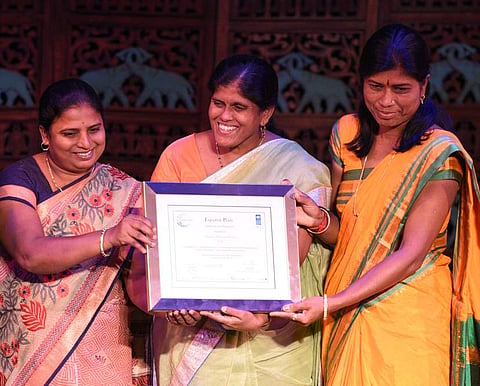How the Arogya Sakhi app is changing the lives of women in rural Maharashtra
In around 60 villages near Pune, women health care workers known as Arogya Sakhis are using mobile technology to conduct preventive diagnostic tests and are educating other women in their community about healthcare, nutrition, and hygiene. The Arogya Sakhi Programme is spearheaded by Naseem Shaikh, a programme manager at Swayam Shikshan Prayog (SSP), a Pune-based development organisation. Naseem has spent the last two decades conceptualising and bringing to the forefront rural women’s leadership in community-driven disaster resilience, particularly in the health and sanitation sectors.
After the massive Latur earthquake in 1993, she took up the enormous challenge of bringing out 500 rural women from as many villages to act as interlocutors between the government and the affected communities. After completion of the recovery efforts, Naseempersisted and redesigned the rural woman's role as a leader and planner, in a project supported by the UNDP, and thereafter, in the next ten-year strategy, as an advocate for basic healthcare, water, and sanitation services.
Disturbed by the increased uptake of health loans and rise in family health expenditure, Naseem, in 2005, decided to explore an innovative model — Community Health Mutual Fund — that allowed women’s federations to own and manage people’s funds for health insurance. Her contribution to society has intrigued us and so, we caught up with her to talk about the NGO and its programmes. Excerpts:
How does SSP work with women in different sectors?
When the women join our organisation, they join in different groups. Some women join in the agriculture sector and self-help groups, while some others join in the healthcare sector. SSP facilitates women to lead self-help groups, social enterprises, and community-centered initiatives that offer rural communities financial services, skill-building and livelihood generation. We provide training, information on products and services in impact sectors such as clean energy, safe water and sanitation, health and nutrition, and agriculture and food security. For instance, if a woman is spreading awareness about menstrual hygiene amongst the rural communities, she will be selling sanitary pads to generate an income from it.
Women of worth: Naseem (extreme right) has been working for other women from the last 22 years
How does the Arogya Sakhi Programme work?
A ‘Sakhi’ is a woman who is interested in the healthcare sector and who takes an initiative to better the rural community towards basic healthcare practices. They basically spread awareness or build a thought process that is initiated through health check-ups and preventive diagnostic tests. All Arogya Sakhis are equipped with a mobile tablet to upload results of the check-up that are then made available to a doctor. The diagnostic tablets facilitate affordable health services for women at their doorstep. They generally help in the early detection of diseases.
After these Sakhis are identified, they undergo intensified training on the healthcare modules, preventive healthcare measures, lifestyle diseases and so on. We select those villages that lack health facilities and interior villages with transportation problems. During her visit, a Sakhi does house-to-house visits, organises healthcare training programmes and camps, basic hygiene demonstrations and so on. The health camps are organised in partnership with different government agencies to analyse the health status of women and their families. Women and adolescent girls are addressed through community meetings on preventive healthcare, hygiene, and sanitation.
On the move: The Sakhis conduct door-to-door check-ups with the help of mobile tablets
Can you tell us more about the technology involved?
The Sakhis conduct door-to-door check-ups and preventive diagnostic tests with the help of mobile tablets with the Arogya Sakhi app. The Sakhi is then required to collect information like personal medical profile, history of medical conditions, test results and health background. They record test results on the tablet and receive analysed reports online from a doctor appointed by SSP, under the Arogya Sakhi Programme. They then deliver these analysed health reports to their doorstep. The Sakhis also provide counselling and conduct follow-up visits and identify high-risk women and their beneficiaries. Once the information is collected and saved on the server, it can be accessed by a doctor. They are then linked with local healthcare providers for further treatment, with discounted services. With the help of technology, we can reach out to many communities with very little errors.
Naseem participated as a panelist for a thematic session at the second World Reconstruction Conference organised by the GFDRR and the World Bank Group, in partnership with the European Union and the UNDP in September 2014
How does this create livelihood?
We build a business and entrepreneurial mindset in Arogya Sakhis while providing their services to generate income and sustainable livelihood. Their services include preventive tests as well as basic products like sanitary pads, nutritional mixes, and herbal medicines. With every test or health service they perform or through the products they sell, the Sakhi is generating some income. For instance, the early identification of lifestyle illnesses in villages has led to the adoption of preventive healthcare practices, reducing health costs within a year. A Sakhi charges ₹20–50 for the tests and earns an average of ₹1,000 a month.


